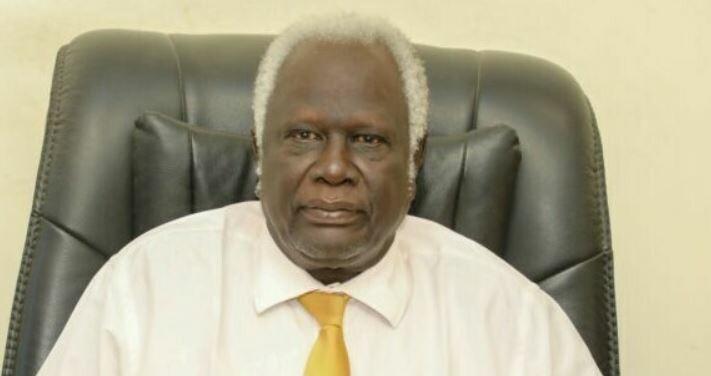Africa-Press – South-Sudan. In an exclusive interview, Professor Abednego Akok Kacuol, the chairperson of the National Elections Commission (NEC), says he is not worried and will organize free and fair elections as he discusses the progress, challenges, and preparations for the upcoming elections.
With six months remaining before the proposed election date, Prof. Akok addresses concerns about the feasibility of the timelines, resources, and the crucial role of the political parties and parliament in ensuring a smooth electoral process.
Below are edited excerpts:
Question: Could you please tell us how the work of the National Elections Commission is progressing?
Answer: The work is progressing well. We have received some funds which have enabled us to visit the states. So far, we have completed visits to eight states, and we have two states and three administrative areas left to visit. After these visits, we will establish state high-committees in the ten states and three administrative areas.
Q: You mentioned visiting eight states. What have you observed on the ground before establishing any of these commissions in the states?
A: The commissions were established in 2015, but since then, their structures have collapsed. Some members have passed away, and others have left their positions. Our visits aimed to assess two things: the existing infrastructure and the available manpower on the ground.
Q: With almost six months remaining until the proposed election date, is that timeline still feasible from the commission’s perspective?
A: Elections themselves are not inherently difficult. The two main challenges are registering eligible voters who are 18 years and older and then conducting the polling. If we have the necessary resources, these tasks are manageable.
Q: You mentioned resources. Do you currently have the necessary resources?
A: We have some resources at the moment but the complete budget is still pending approval from the National Assembly.
Q: You indicated that voter registration was scheduled to start in June, which is just a week away. Is that still feasible?
A: In February, we aimed to solidify the entire program instead of leaving it open-ended. However, we are not the final decision-makers. The final decisions rest with the political parties that signed the peace agreement. We suggested starting elections in June, but the delay is on their part. If they had committed to this electoral calendar, we could have already started the registration.
Q: Many argue that there is nothing concrete on the ground to ensure that elections will take place within the next six months. What is your response to those who believe elections cannot be conducted within this timeframe?
A: Those who hold that view are entitled to their opinion. However, as a technical person mandated to conduct elections, I am bound by law to take action. It is important to remind the public that the Elections Commission Act states that when six months remain before elections, the commission must declare the election date. Furthermore, the revitalized peace agreement requires that elections be conducted two months before the end of the transitional period. Therefore, we must adhere to these requirements.
Q: What do you mean when you say “All of us must face that”? Does this imply there is doubt that the elections might not take place in December as proposed?
A: I have no doubts. I am trusted and guided by the law, and my role is to implement that law. By doing so, there is nothing to fear. We aim to establish a democratic system after the transitional period, and for that, the law must guide us.
Q: How much have you received in terms of budget for the elections, and what is still needed?
A: We have received only SSP 22 million which is a small amount compared to what we need. The complete budget needs to be approved by the assembly to enable us to acquire the necessary electoral materials.
Q: When you say you have received SSP 22 million and still need a large budget, how much more are you expecting?
A: The budget proposal we submitted last year was USD 236 million.
Q: And out of the 236 million dollars, you have only received 22 million SSP, is that correct?
A: Yes, and if you convert that to dollars, it might be around 11 or 12 million. However, I am not worried. My focus is on demonstrating what we can achieve with the resources we have and reminding the decision-makers to ensure the full budget is passed so we can proceed with our plans.
Q: Professor Akok, what are your biggest worries about delivering free, fair, and credible elections within the next six months, given the huge task you have been given?
A: I am not worried. I am guided by the Almighty God who has given me wisdom. Additionally, the Elections Act provides me with clear guidelines. The public should remember that sovereignty belongs to them, and the power is theirs. This power will be transferred to the people through peaceful, credible, and impartial elections.
Q: You visited the states and have seen the situation firsthand. What have you accomplished in those states so far?
A: Some months ago, the president instructed all governors to allot buildings to the Elections Commission. For example, in Central Equatoria, we have been allotted an office. In Aweil, there is an office available, but it needs maintenance.
Q: You have been allotted offices, but has the recruitment of people to work in these offices been completed?
A: We are currently compiling a report based on recommendations from state authorities, civil society, women, and youth groups. Once this report is complete, we will create a list and appoint personnel.
Q: Are you saying there are still no established teams in the states?
A: There are existing personnel, though some have passed away and others have left their jobs. We will replace those who are no longer available, but there are still people on the ground.
Q: How long will it take to replace them as part of the preparations?
A: It will not take more than 15 days. Once we complete the process, it should take no more than two weeks.
Q: The delay in passing the budget for the elections is probably affecting the progress of your institution. What are you doing in your capacity as the chairperson of the Election Commission to ensure the parliament passes the budget on time?
A: We are currently working on the budget and urging parliament to speed up its passage through various media channels.
Q: In case they fail to pass the budget on time, do you have a Plan B?
A: There is no Plan B because failure is not an option. Passing the budget is their mandate and trust. We are guided by the peace agreement, which mandates that elections must be conducted two months before the end of the transitional period. Additionally, it is essential for the legitimacy of the government that people elect their leaders.
Q: The spokesperson of the parliament recently said the current budget period is over, and we are now expecting the next fiscal year’s budget. Will this delay your budget to the next fiscal year, and how will that affect your work?
A: I am planning to discuss this matter with the speaker of the parliament.
For More News And Analysis About South-Sudan Follow Africa-Press






